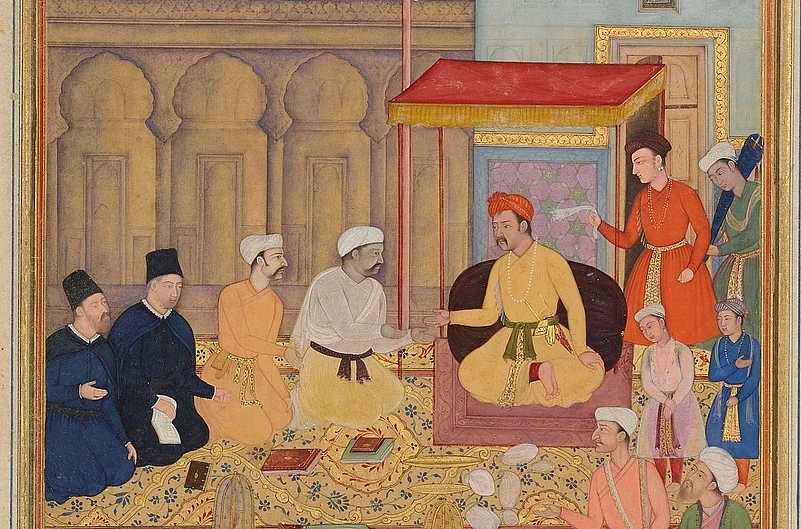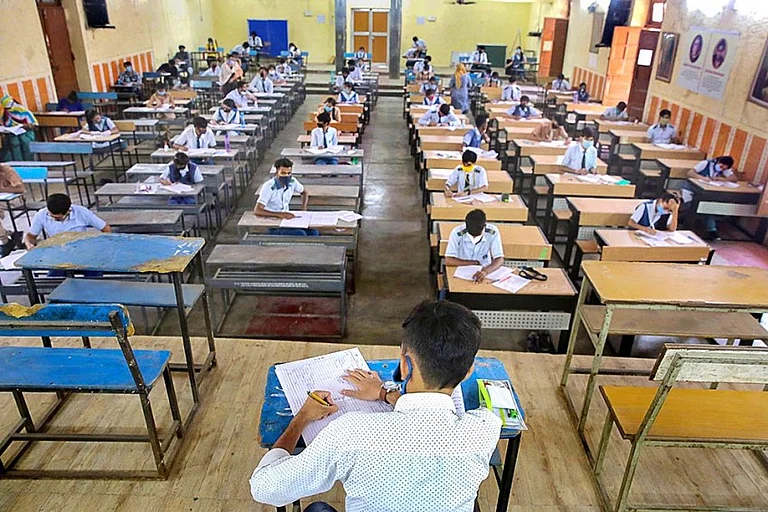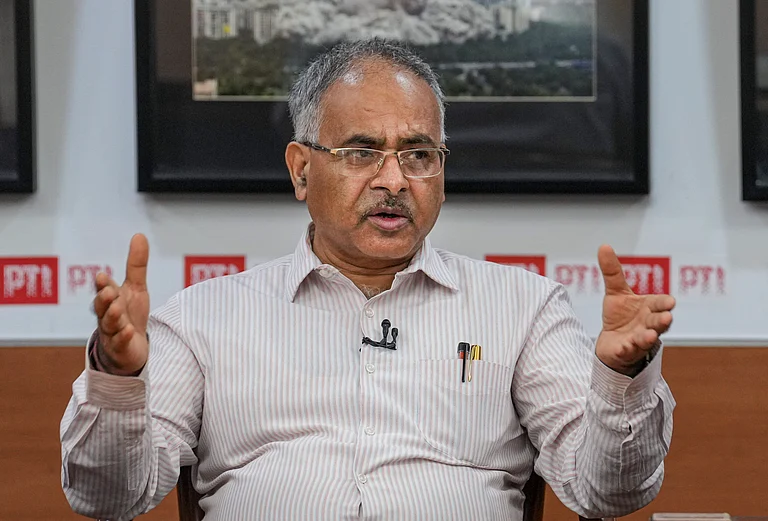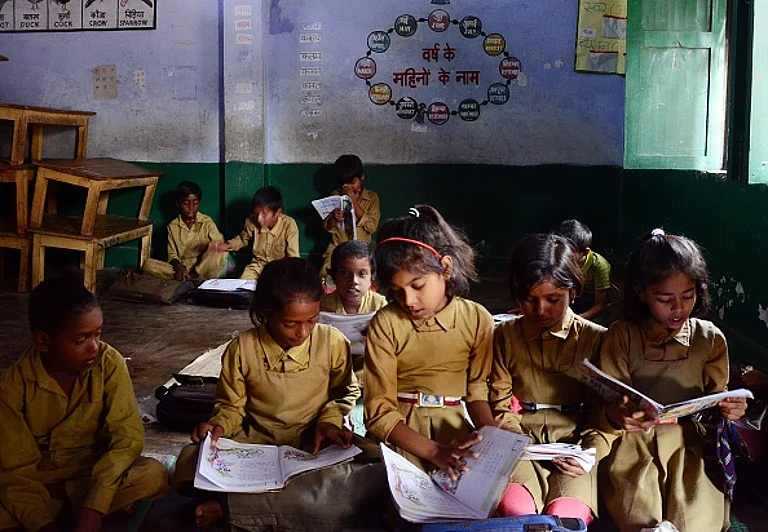As Mughals re-enter the secondary classroom, a redefined legacy begins to take shape. Descriptions ranging from “brutal and ruthless” to rulers who “plundered” the Indian population now take precedence. A carefully placed disclaimer follows - “it is important to keep in mind that we, today, bear no responsibility for actions of individuals hundreds of years ago”.
Does this disclaimer inherently validate the effect that such rousing descriptions might cause?
Imtiaz Ahmad, former Director of the Khuda Bakhsh Library and a senior historian, compares this disclaimer to the statutory warning displayed on cigarette packets. He states that the fact that this is highlighted means it is controversial. “These issues can be discussed and debated at length in the academic circles, at the higher levels of education, why impose this sort of a you versus me concept in the school textbooks?,” he says.
The textbook titled ‘Exploring Society: India and Beyond’ has been released in line with the National Education Policy 2020 and the National Curriculum Framework for School Education 2023. The topics were previously covered for Class 7th but have now been introduced for Class 8th in the first part of the new Social Science textbook, which has combined History, Geography, Civics, and Economics into one book.
NCERT had previously retracted much of the Mughal history from Class 7th to 12th as per the rationalised syllabus in the 2023-24 session. Its reintroduction paints a contrasting picture of how the Mughal empire is depicted.
Dr. Sheikh Mujibur Rehman, an expert in Muslim politics and history and the author of Shikwa-e-Hind - The Political Future of Indian Muslims states that things are being done with a clear ideological view and there are certain distortions. “History at the early stages of schools should be slightly more nuanced and represent a consensus rather than the ideological viewpoints,” he says.
What do the Chapters include?
The History textbook recently introduced for Class 8th by the National Council of Educational Research and Training (NCERT) in the current 2025-26 session term Babur as a “brutal and ruthless conqueror, slaughtering entire populations of cities”, Akbar’s reign as a “blend of brutality and tolerance”, and Aurangzeb as someone who destroyed temples and gurdwaras.
A dedicated autobiography for Babur, the first Mughal emperor titled Baburnama shows him as cultured and intellectually curious. Aspects like ruthless conqueror, slaughtering populations, enslaving women and children, and taking pride in erecting “towers of skulls” in plundered cities follow; a huge leap from what the previous textbooks ascribed. Why so? “We are working on a completely different foundation. We have a different curriculum framework, a different mandate, a different pedagogy, a different syllabus, everything is different and we are writing new textbooks,” says Michel Danino, Head, NCERT’s Curricular Area Group for Social Science.
The book refers to “jiziya”, a tax imposed by the Mughals on non-Muslim subjects for protection and exemption from military service as a source of public humiliation and an incentive for subjects to convert to Islam. This was previously described as a tax that was initially paid with land and later as a separate one.
Akbar’s reign is explored as a “blend of brutality and tolerance”. The book highlights that when Akbar conquered the Rajput fort of Chittorgarh, he ordered the massacre of 30,000 civilians. His message of victory is quoted in the textbook: “We have succeeded in occupying a number of forts and towns belonging to the infidels and have established Islam there. With the help of our bloodthirsty sword, we have erased the signs of infidelity from their minds and have destroyed temples in those places and also all over Hindustan.” The chapter asserts that he learnt peace and tolerance in a later phase of his life, however, “non-Muslims were kept in a minority in the higher echelons of the administration”.
The syllabus points towards the Delhi Sultanate period with “many instances of religious intolerance”. It describes the Sultanate period as being marred by political instability and housing several instances of attacks on temples and cities being plundered. Mughal rule witnessed “numerous attacks on sacred or revered images in Buddhist, Jain and Hindu temples; such destruction was motivated not just by plunder but also by iconoclasm”.
“We cannot sanitise history. We also have to look at the pedagogical part. One cannot sweep them under the carpet as if they did not exist. Our business is to do honest history, which means we have to look at what happened truthfully,” Danino asserted.
“Do you think in Germany they will remove chapters on the Second World War or in the UK or France? They will not. I am not making a comparison. I am not saying that this or that was like Nazi Germany. I am not saying that. I am saying that everywhere there are darker sides of history, moments, manifestations, call it what you like, and these have to be known,” he added.
The Impact
Ahmad asserts that such loaded language and descriptions in school textbooks from the very beginning would lead to children developing prejudices. “Once such biases become deep-rooted, it is very difficult to overcome them at a later stage,” he says.
He further states that our nation was built on the idea of unity in diversity. “Such writing does not serve the purpose of India as an entity which embodies unity in diversity. This is not just the problem in India. World over, a particular political viewpoint is generally projected through historical writing at whatever level under a certain type of regime,” he says.
NCERT’s Stance
The NCERT defended the content of the textbook ‘Exploring Society, India and Beyond’ by releasing an official statement stating that “All the facts presented in this textbook are based on well-known primary and secondary academic sources. To avoid generation of any prejudice and misunderstanding, a note on history's darker period has been added on page 20 for the benefit of the learners."
“The note sums up the essence of the content presented in the textbook; the entire textbook should be seen and appreciated from this perspective," it added.
Danino says that we in India lack maturity to deal with history. The note should be self-evident, but unfortunately it is not, he says.
“Therefore, we put this disclaimer even though, strictly speaking, it is superfluous. We should all be aware of what the disclaimer expresses,” he added.
The progress and administrative prowess under the Mughal sultanate is also touched upon in the following chapter. “There was another chapter called Cultural Currents from the 13th to the 17th century. It is clearly mentioned and referred to. That chapter was supposed to be there and take care of all kinds of complex cultural interactions, which did happen during this whole period. Unfortunately, it could not be made ready in time, and it would have delayed the textbook further, so we decided to keep it for part two of it,” says Danino.
Contemporary Socio-Political Concerns
Dr. Rehman asserts that he finds the disclaimer to be a little contradictory as such content might further the prejudices against the minority community that are already prevalent in our society.
“In general, my own sense is that there is an attempt to present the current generation of Muslims as essentially glorifying the Mughal dynasty,” he says.
Danino claims that whatever one writes, especially in the Indian context, will make some people unhappy. “In fact, even among our close collaborators, there were certain criticisms, and our answer was that it's not possible to write history in a way that's going to please everybody. Therefore, what we must do is write an honest history, and just don't worry whether we are pleasing X or displeasing Y, or upsetting Z. It's endless,” he adds.
The textbook also contains chapters on the Maratha’s who are seen as having “contributed substantially to India’s cultural developments.”




























